- Home
- Georgette Heyer
An Infamous Army Page 3
An Infamous Army Read online
Page 3
‘Your ladyship is never backward in any attention—most flattering distinction! I am all obligation!’ he said, bowing to her. ‘It is just as it should be, for I’m sure Lucy is fit to move in the first circles—ay, and to make a good match into the bargain, eh, Lucy? Ah, she don’t like me to quiz her about it: she is blushing, I daresay, only it is too dark to see.’
Judith could not but feel a little vexation that he should expose himself so to Worth, but she passed it off with tact. Miss Devenish was handed into the carriage, the Earl followed her, and in a moment they were off, leaving Mr Fisher bowing farewell upon the pavement.
‘Dear Lady Worth, this is very kind of you!’ said Miss Devenish, in a pretty, low voice. ‘My aunt desired her compliments. I did not keep you waiting, I hope?’
‘No, indeed. I only hope it won’t prove an insipid evening. I believe there may be dancing, and I suppose all the world and his wife will be there.’
It certainly seemed so. When they arrived, Lady Charlotte’s salons were already crowded. The English predominated, but there were any number of distinguished foreigners present. Here and there were to be seen the blue of a Dutch uniform, and the smart rifle-green of a Belgian dragoon; and everywhere you should chance to look you might be sure of encountering the sight of scarlet: vivid splashes of scarlet, throwing into insignificance all the ladies’ pale muslins, and every civilian gentleman’s more sober coat. Civilian gentlemen were plainly at a discount, and the young lady who could not show at least one scarlet uniform enslaved was unhappy indeed. Wits and savants went by the board; the crowd was thickest about Lord Hill, who had dropped in for half an hour. His round face wore its usual placid smile; he was replying with inexhaustible patience and good humour to the anxious inquiries of the females clustering round him. Dear Lord Hill! So kind, so dependable! He was not like the Duke, of course, but one need not pack one’s trunks and order the horses to be put to for an instant flight to Antwerp while he was there to pledge one his word the Corsican Monster was still in Paris.
He had just reassured the Annesley sisters, two ethereal blondes, whose very ringlets were appealing. When Worth’s party came into the room, they had moved away from Lord Hill, and were standing near the door, a lovely fragile pair, so like, so dotingly fond!
They were both married, the younger, Catharine, being one of the season’s brides, with a most unexceptionable young husband to her credit, Lord John Somerset, temporarily attached to the Prince of the Orange’s personal staff. It was strange that Catharine, decidedly her sister’s inferior in beauty and brain, should have done so much better for herself in the marriage market. Poor Frances, with her infinite capacity for hero-worship, had made but a sad business of it after all, for a less inspiring figure than her tow-headed, chattering, awkward Mr Webster would have been hard to find. You could hardly blame her for having fallen so deeply in love with Lord Byron. Quite an affaire that had been, while it lasted. Happily that had not been for very long—though long enough, if Catharine’s indiscreet tongue were to be trusted, to enable her to secure one of the poet’s precious locks of hair. That was more than Caro Lamb could boast of, poor soul.
She too was in Brussels, quite scandalising the old-fashioned with her gossamer gauzes, always damped to make them cling close to her limbs, generally dropping off one thin shoulder, and allowing the interested an intimate view of her shape. Old Lady Mount Norris was ready to stake her reputation on Caroline’s wearing under her gauze dresses not a stitch of clothing beyond an Invisible Petticoat. Well, her own daughter might possess a lock of Byron’s hair, but one was able to thank God she did not flaunt herself abroad next door to naked.
Lord Byron was not in Brussels. Perhaps he was too taken up with that queer, serious bride of his; perhaps he knew that even a poet as beautiful and as sinister as himself would not make much of a mark in Brussels on the eve of war.
His marriage had been a great shock to Caro Lamb, said the gossipers. Poor thing, one was truly sorry for her, however ridiculous she might have made herself. It was quite her own fault that she now looked so haggard. She was unbecomingly thin too; every lady was agreed on that. Sprite? Ariel? Well, one had always thought such nicknames absurd; one really never had admired her. Only gentlemen were sometimes so silly!
There were quite a number of gentlemen round Lady Caroline, all being regrettably silly. A murmur from Miss Devenish reached Lady Worth’s ears: ‘Oh! she’s so lovely! I like just to look at her!’
Judith hoped that she was not uncharitable, but had no wish to exchange more than a smile and a bow with Lady Caroline. One was not a prude, but really that lilac gauze was perfectly transparent! And if it came to loveliness, Judith considered her protégée quite as well worth looking at as any lady in the room. If her eyelashes were not as long and curling as Lady Frances Webster’s the eyes themselves were decidedly more brilliant, and of such a dove-like softness! Her shape, though she might conceal it with discretion, was quite as good as Caro Lamb’s; and her glossy brown curls were certainly thicker than Caroline’s short feathery ringlets. Above all, her expression was charming, her smile so spontaneous, the look of grave reflection in her eye so particularly becoming! She dressed, moreover, with great propriety of taste, expensively but never extravagantly. Any man might congratulate himself on acquiring such a bride.
These reflections were interrupted by the necessity of exchanging civilities with the Marquise d’Assche. Judith turned from her presently to find Miss Devenish waiting to engage her attention.
‘Dear Lady Worth,’ said Miss Devenish, ‘you know everyone, I believe. Only tell me who is that beautiful creature come into the room with Lady Vidal. Is it very wrong?—I could not but gasp and think to myself: “Oh, if I had but that hair!” Everyone is cast into the shade!’
‘Good gracious, whom in the world can you have seen?’ said Judith, smiling with a little amusement. However, when her eyes followed the direction of Miss Devenish’s worshipful gaze, the smile quickly faded. ‘Good God!’ she said. ‘I had no idea that she was back in Brussels! Well, Lucy, if you are looking at the lady with the head of hair like my best copper coalscuttle, let me tell you that she is none other than Barbara Childe.’
‘Lady Barbara!’ breathed Miss Devenish. ‘I wondered—You must know that I never till now set eyes on her. Yes, one can see the likeness: she is a little like her brother, Lord Vidal, is she not?’
‘More like Lord George, I should say. You do not know him: a wild young man, I am afraid; very like his sister.’
Miss Devenish made no reply to this observation, her attention remaining fixed upon the two ladies who had come into the salon.
The elder, Lady Vidal, was a handsome brunette, whose air, dress, and deportment all proclaimed the lady of fashion. She was accompanied by her husband, the Marquis of Vidal, a fleshy man, with a shock of reddish hair, a permanent crease between thick, sandy brows, and a rather pouting mouth.
Beside Lady Vidal, and with her hand lightly resting on the arm of an officer in Dutch-Belgian uniform, stood the object of Miss Devenish’s eager scrutiny.
Lady Barbara Childe was no longer in the first flush of her youth. She was twenty-five years old, and had been three years a widow. Having married to oblige her family at the age of seventeen, she had had the good fortune to lose a husband three times as old as herself within five years of having married him. Her mourning had been of the most perfunctory: indeed, she was thought to have grieved more over the death of her father, an expensive nobleman of selfish habits, and an unsavoury reputation. But the truth was she did not grieve much over anyone. She was heartless.
It was the decision of all who knew her, and of many who did not. No one could deny her beauty, or her charm, but both were acknowledged to be deadly. Her conquests were innumerable; men fell so desperately in love with her that they became wan with desire, and very often did extremely foolish things when they discovered that she did not care the snap of her fingers for them. Young Mr Vane had actually
drunk himself to death; and poor Sir Henry Drew had bought himself a pair of colours and gone off to the Peninsula with the declared intention of being killed, which he very soon was; while, more shocking than all the rest, Bab had allowed her destructive green eyes to drift towards Philip Darcy, with the result that poor dear Marianne, who had been his faithful wife for ten years, now sat weeping at home, quite neglected.
It was a mystery to the ladies what the gentlemen found so alluring in those green eyes, with their deceptive look of candour. For green they were, let who would call them blue. Bab had only to put on a green dress for there to be no doubt at all about it. They were set under most delicately arched brows, and were fringed by lashes which had obviously been darkened. That outrageously burnished head of hair might be natural, but those black lashes undoubtedly were not. Nor, agreed the waspish, was that lovely complexion. In fact, the Lady Barbara Childe, beyond all other iniquities, painted her face.
It became apparent to those who were gazing at her that the Lady Barbara had not, on this night of April, stopped at that. One foot was thrust a little forward from under the frills of a yellow-spangled gown, and it was seen that the Lady Barbara, wearing Grecian sandals, had painted her toenails gold.
Miss Devenish was heard to give a gasp. Lady Sarah Lennox, on the arm of General Maitland, said: ‘Gracious, only look at Bab’s feet! She learned that trick in Paris, of course.’
‘Dashing, by Jove!’ said the General appreciatively.
‘Very, very fast!’ said Lady Sarah. ‘Shocking!’
It was not the least part of Barbara’s charm that having arrayed herself in a startling costume she contrived thereafter to seem wholly unconscious of the appearance she presented. She was never seen to pat her curls into place, or to cast an anxious glance towards the mirror. No less a personage than Mr Brummell had taught her this magnificent unconcern. ‘Once having assured yourself that your dress is perfect in every detail,’ had pronounced that oracle, ‘you must not give it another thought. No one, I fancy, has ever seen me finger my cravat, twitch at the lapels of my coat, or smooth creases from my sleeve.’
So the Lady Barbara, in a shimmering golden gown of spangles which clung to her tall shape as though it had been moulded to it, with her gold toenails, and her cluster of red curls threaded with a golden fillet, was apparently quite oblivious of being the most daringly dressed lady in the room. Fifty pairs of eyes were fixed upon her, some in patent disapproval, some in equally patent admiration, and she did not betray by as much as a flicker of an eyelid that she was aware of being a cynosure. That dreadfully disarming smile of hers swept across her face, and she moved towards Lady Worth, and held out her hand, saying in her oddly boyish voice: ‘How do you do? Is your little boy well?’
In spite of the fact that Judith had been by no means pleased, three months before, to see her infant son entranced by the Lady Barbara’s charms, this speech could not but gratify her. ‘Very well, thank you,’ she replied. ‘Have you been back in Brussels long?’
‘No, two days only.’
‘I did not know you have the intention of returning.’
‘Oh—! London was confoundedly flat,’ said Bab carelessly.
Miss Devenish, who had never before heard such a mannish expression on a lady’s lips, stared. Lady Barbara glanced down at her from her graceful height, and then looked at Judith, her brows asking a question. A little unwillingly—but, after all, it was not likely that Bab would waste more than two minutes of her time on little Lucy Devenish—Judith made the necessary introduction. The smile and the hand were bestowed; Barbara made a movement with her fan, including in the group the officer on whose arm she had entered the salon. ‘Lady Worth, do you known M. le Capitaine Comte de Lavisse?’
‘I believe we have met,’ acknowledged Judith, devoutly hoping that Brussels’ most notorious rake would not take one of his dangerous fancies to the damsel in her charge.
However, the Captain Count’s dark eyes betrayed no more than a fleeting interest in Miss Devenish, and before any introduction could be made a young gentleman with embryonic whiskers, and a sandy head at lamentable difference with his scarlet dress coat, joined them.
‘Hallo, Bab!’ said Lord Harry Alastair. ‘Servant, Lady Worth! Miss Devenish, do you know they are dancing in the other room? May I have the honour?’
Judith, smiling a gracious permission, could not but feel that the path of a chaperon was a hard one. The reputation of the Alastairs, from Dominic, Duke of Avon, down to his granddaughter, Barbara, was not such as to lead a conscientious duenna to observe with pleasure her charge being borne off by any one of them. She comforted herself with the reflection that Lord Harry, an eighteen-year-old Ensign could hardly be considered dangerous. Had it been Lord George, now! But Lord George, happily, was not in Belgium.
By the time Lord Harry had escorted Miss Devenish to the ballroom, the inevitable crowd had gathered round his sister. Lady Worth escaped from it, but not before she had been asked (inevitably, she thought) for news from Vienna.
Rumours and counter-rumours were as usual being circulated; the English in Brussels seemed to be poised for flight; and the only thing that would infallibly reassure the timorous was the certain news of the Duke’s arrival.
It was easy to see what Brussels would make of him when he did come. ‘The pedestal is ready for the hero,’ said Judith, with rather a provocative smile. ‘And we are all ready to kneel and worship at the base. I hope he may be worthy of our admiration.’
General Maitland, to whom she had addressed this remark, said: ‘Do you know him, Lady Worth?’
‘I have not that pleasure. Pray do not mention it, but I have never so much as laid eyes on him. Is it not shocking?’
‘Oh!’ said the General.
She raised her brows. ‘What am I to understand by that, if you please? Shall I be disappointed? I warn you, I expect a demi-god!’
‘Demi-god,’ repeated the General, stroking one beautiful whisker. ‘Well, I don’t know. Shouldn’t have called him so myself.’
‘Ah, I am to be disappointed! I feared as much.’
‘No—no,’ said the General. ‘Not disappointed. He is a very able commander.’
‘That sounds a little flat, I confess. Is it only the ladies who worship him? Do not his soldiers?’
‘Oh no, nothing like that!’ said the General, relieved to be able to answer a plain question. ‘I believe they rather like him than not: they like to see his hook nose among them at any rate; but they don’t worship him. Don’t think he’d care for it if they did.’
She was interested. ‘You present me with a new picture, General. My brother-in-law is quite devoted to him, I believe.’
‘Audley? Well, he’s one of his family, you see.’ He observed a bewildered look on her face, and added: ‘On his staff, I should say. That’s another matter altogether. His staff know him better than the rest of us.’
‘This is more promising. He is unapproachable. A demi-god should certainly be so.’
He laughed suddenly. ‘No, no, you won’t find him unapproachable, Lady Worth, I pledge you my word!’
Their conversation was interrupted by Sarah and Georgiana Lennox, who came up to them with their arms entwined. The General greeted the elder sister with such a warm smile that Lady Worth was satisfied that rumour had not lied about his purpose of re-marriage. Lady Sarah went off on his arm; Georgiana remained beside Judith, watching the shifting crowd for a few moments. She presently said in rather a thoughtful voice: ‘Do you see that Bab Childe is back?’
‘Yes, I have been speaking to her.’
‘I must say, I wish she had stayed away,’ confided Georgiana. ‘It is the oddest thing, because, for myself, I don’t dislike her, but wherever she is there is always some horrid trouble, or unhappiness. Even Mama, who is never silly, is a little afraid she may cast her eyes in March’s direction. Of course, we don’t breathe a word of such a thing at home, but it’s perfectly true.’
‘What
, that your brother—’
‘Oh no, no, but that Mama fears he might! One can’t blame her. There does seem to be something about Bab which drives quite sensible men distracted. Dreadful, isn’t it?’
‘I think it is.’
‘Yes, so do I,’ said Georgiana regretfully. ‘I wish I had it.’
Judith could not help laughing, but she assured her vivacious young friend that she was very well as she was. ‘All the nicest men pay their court to Georgy,’ she said. ‘It is men like the Comte de Lavisse who run after Lady Barbara.’
‘Yes,’ sighed Georgiana, looking pensively in the direction of the Count. ‘Very true. Of course one would not wish to be admired by such a person.’
This sentiment was echoed by the Lady Barbara’s brother, much later in the evening. As his carriage conveyed him and his ladies home to the Rue Ducale he said in a peevish tone that he wondered Bab could bear to have that foreign fellow for ever at her elbow.
She only laughed, but his wife, who had been yawning in her corner of the carriage, said sharply: ‘If you mean Lavisse, I am sure I don’t know why you should. I only wish Bab may not play fast and loose with him. I believe he is extremely rich.’
This argument was one that could not but appeal to the Marquis. He was silent for a few moments, but presently said: ‘I don’t know about that, but I can tell you his reputation doesn’t bear looking into.’
‘If it comes to that, Bab’s own reputation is not above reproach!’
Another gurgle of laughter came from the opposite corner of the carriage. The Marquis said severely: ‘It’s all very well to laugh. No doubt it amuses you to make your name a byword. For my part, I have had enough of your scandals.’
‘Oh, pray spare us a homily!’ said his wife, yawning again.
‘Don’t be anxious, Vidal! They’re laying odds against Lavisse’s staying the course for more than a month.’
The carriage passed over an uneven stretch of pavé. Unpleasantly jolted, the Marquis said angrily: ‘Upon my word! Do you like to have your name bandied about? Your affairs made the subject of bets?’

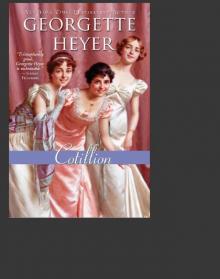 Cotillion
Cotillion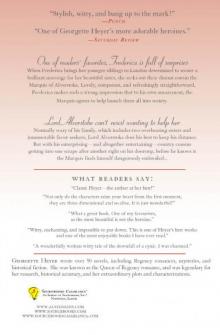 Frederica
Frederica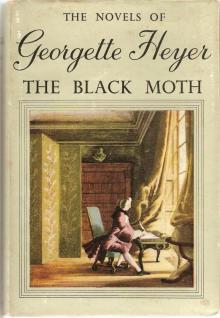 The Black Moth: A Romance of the XVIIIth Century
The Black Moth: A Romance of the XVIIIth Century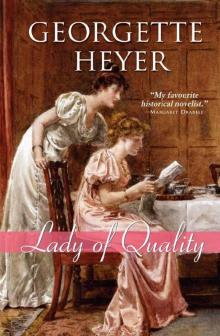 Lady of Quality
Lady of Quality Snowdrift and Other Stories
Snowdrift and Other Stories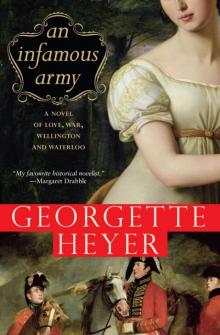 An Infamous Army
An Infamous Army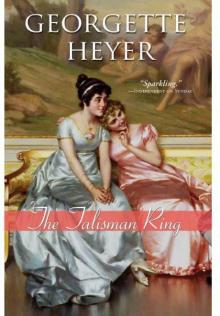 The Talisman Ring
The Talisman Ring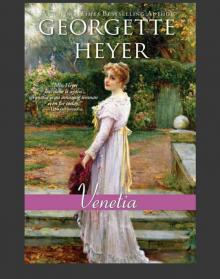 Venetia
Venetia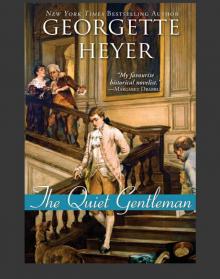 The Quiet Gentleman
The Quiet Gentleman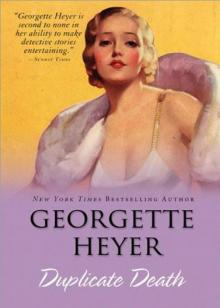 Duplicate Death
Duplicate Death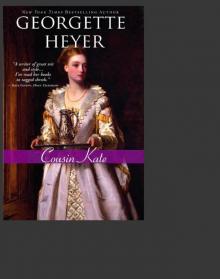 Cousin Kate
Cousin Kate Black Sheep
Black Sheep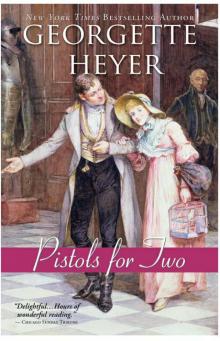 Pistols for Two
Pistols for Two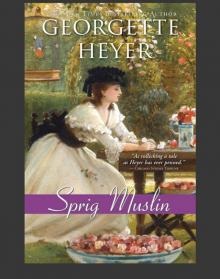 Sprig Muslin
Sprig Muslin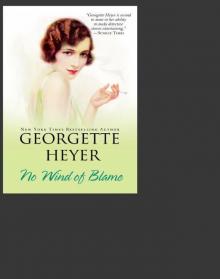 No Wind of Blame
No Wind of Blame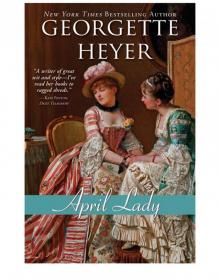 April Lady
April Lady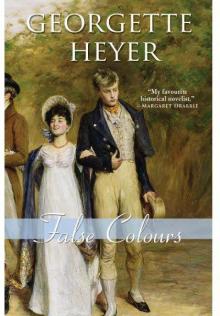 False Colours
False Colours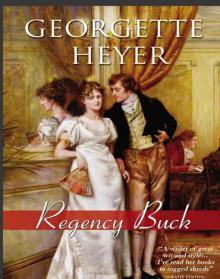 Regency Buck
Regency Buck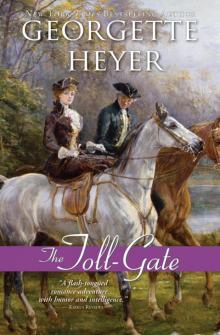 The Toll-Gate
The Toll-Gate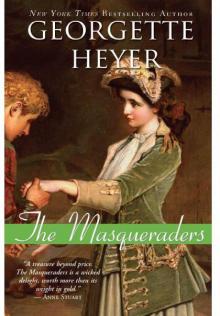 The Masqueraders
The Masqueraders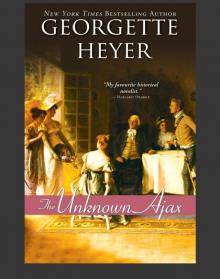 The Unknown Ajax
The Unknown Ajax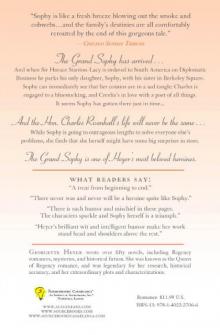 The Grand Sophy
The Grand Sophy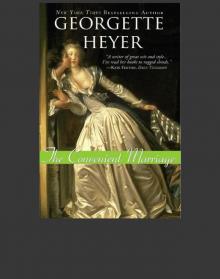 The Convenient Marriage
The Convenient Marriage Faro's Daughter
Faro's Daughter The Conqueror
The Conqueror The Foundling
The Foundling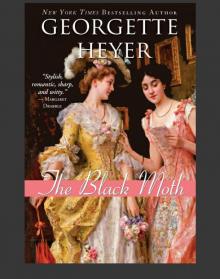 The Black Moth
The Black Moth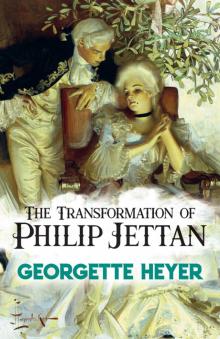 The Transformation of Philip Jettan
The Transformation of Philip Jettan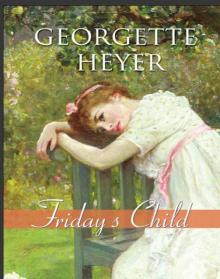 Friday's Child
Friday's Child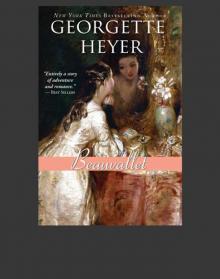 Beauvallet
Beauvallet They Found Him Dead
They Found Him Dead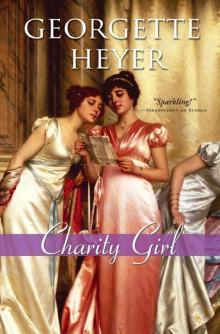 Charity Girl
Charity Girl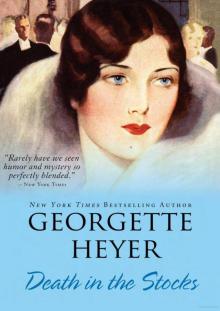 Death in the Stocks: Merely Murder
Death in the Stocks: Merely Murder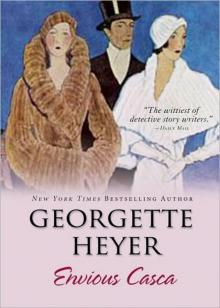 Envious Casca
Envious Casca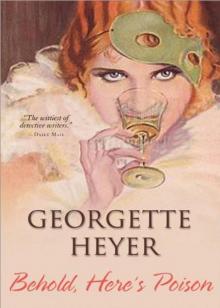 Behold, Here's Poison
Behold, Here's Poison Arabella
Arabella The Nonesuch
The Nonesuch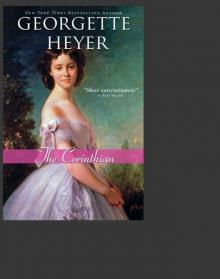 The Corinthian
The Corinthian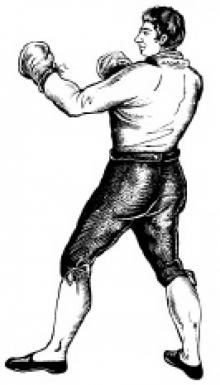 Jennifer Kloester
Jennifer Kloester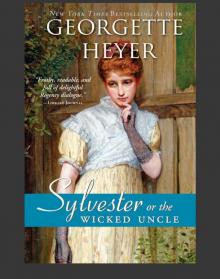 Sylvester
Sylvester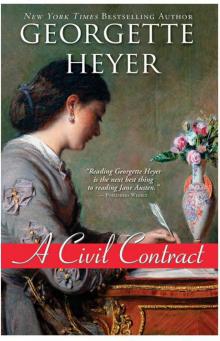 A Civil Contract
A Civil Contract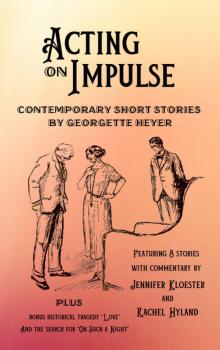 Acting on Impulse
Acting on Impulse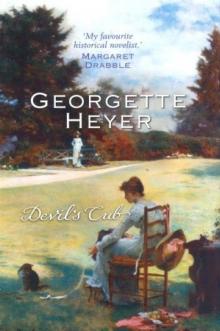 Devil’s Cub at-2
Devil’s Cub at-2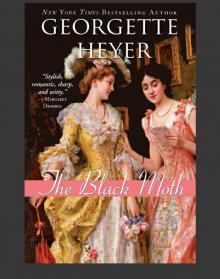 Black Moth
Black Moth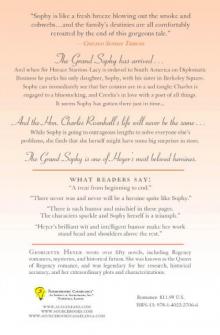 Grand Sophy
Grand Sophy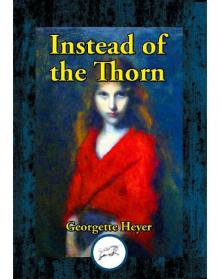 Instead of the Thorn
Instead of the Thorn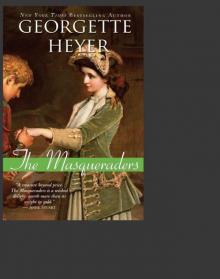 Masqueraders
Masqueraders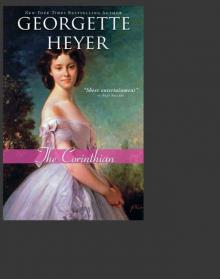 Corinthian
Corinthian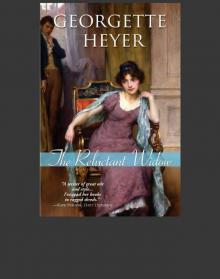 Reluctant Widow
Reluctant Widow